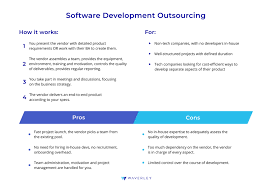Maximizing Business Potential with Offshore Development Services
The Benefits of Offshore Development Services
Offshore development services have become increasingly popular in today’s globalized world. Companies around the globe are leveraging the expertise and cost advantages offered by offshore development teams to enhance their products and services. Let’s explore some of the key benefits of offshore development services:
Cost-Effectiveness
One of the primary reasons companies opt for offshore development is cost savings. Offshore teams often operate in countries with lower labor costs, allowing businesses to access top talent at a fraction of the cost compared to hiring locally.
Access to Global Talent Pool
Offshore development services provide access to a diverse pool of skilled professionals from around the world. This enables companies to tap into specialized expertise that may not be readily available in their local market.
Faster Time-to-Market
By working with offshore development teams, companies can accelerate their product development cycles and bring new offerings to market more quickly. This agility is crucial in today’s fast-paced business environment.
Scalability and Flexibility
Offshore development services offer scalability and flexibility, allowing businesses to easily ramp up or down resources based on project requirements. This adaptability ensures that companies can efficiently manage fluctuating workloads.
Round-the-Clock Operations
With teams distributed across different time zones, offshore development services enable round-the-clock operations. This 24/7 productivity can lead to faster project completion and enhanced customer support.
Risk Mitigation
Offshore development services help mitigate risks associated with talent shortages, project delays, or unforeseen challenges. By diversifying their talent pool geographically, companies can enhance their risk management strategies.
In conclusion, offshore development services offer a range of benefits that can empower businesses to innovate, grow, and stay competitive in today’s dynamic marketplace. By harnessing the power of global collaboration, companies can unlock new opportunities for success.
7 Essential Tips for Successfully Managing Offshore Development Services
- Clearly define your project requirements and goals before engaging with an offshore development service.
- Research and select a reputable offshore development company with a proven track record of successful projects.
- Establish open and clear communication channels to ensure effective collaboration with the offshore team.
- Set realistic timelines and milestones to keep the project on track and monitor progress regularly.
- Ensure that intellectual property rights and data security measures are clearly addressed in the contract with the offshore service provider.
- Provide thorough documentation and training materials to facilitate smooth knowledge transfer to the offshore team.
- Regularly evaluate performance, provide feedback, and address any issues promptly to maintain project quality.
Clearly define your project requirements and goals before engaging with an offshore development service.
It is crucial to clearly define your project requirements and goals before engaging with an offshore development service. By having a well-defined scope, timeline, and objectives in place, you can effectively communicate your expectations to the offshore team. This clarity helps ensure that both parties are aligned on the project deliverables and can work towards a successful outcome. Additionally, outlining specific requirements upfront can streamline the development process, minimize misunderstandings, and ultimately lead to a more efficient and productive collaboration with the offshore team.
Research and select a reputable offshore development company with a proven track record of successful projects.
When considering offshore development services, it is crucial to research and choose a reputable company with a demonstrated history of successful projects. By selecting a trusted offshore development partner, businesses can ensure quality results and minimize risks associated with outsourcing. A proven track record indicates reliability, expertise, and the ability to deliver on commitments, ultimately leading to a productive and successful collaboration that aligns with the company’s goals and expectations.
Establish open and clear communication channels to ensure effective collaboration with the offshore team.
Establishing open and clear communication channels is crucial when engaging in offshore development services. Effective collaboration with the offshore team heavily relies on transparent and consistent communication. By fostering a culture of openness, sharing information, and maintaining regular updates, businesses can ensure that project requirements are clearly understood, potential issues are addressed promptly, and progress is tracked effectively. Clear communication channels help build trust, mitigate misunderstandings, and promote a harmonious working relationship between onshore and offshore teams, ultimately leading to successful project outcomes.
Set realistic timelines and milestones to keep the project on track and monitor progress regularly.
Setting realistic timelines and milestones is crucial when leveraging offshore development services to ensure project success. By establishing clear objectives and deadlines, teams can stay focused, maintain accountability, and track progress effectively. Regular monitoring of milestones allows for early identification of any potential issues or delays, enabling prompt corrective actions to keep the project on track. This proactive approach helps streamline communication, enhance collaboration, and ultimately deliver high-quality results within the specified timeframe.
Ensure that intellectual property rights and data security measures are clearly addressed in the contract with the offshore service provider.
It is crucial to ensure that intellectual property rights and data security measures are clearly addressed in the contract when engaging with an offshore service provider for development services. By clearly outlining these aspects in the agreement, businesses can protect their proprietary information and sensitive data from unauthorized access or misuse. Addressing intellectual property rights and data security in the contract helps establish a framework for compliance, confidentiality, and accountability, fostering a secure and trustworthy partnership with the offshore service provider.
Provide thorough documentation and training materials to facilitate smooth knowledge transfer to the offshore team.
To ensure a successful collaboration with offshore development teams, it is essential to provide comprehensive documentation and training materials. By offering clear guidelines, detailed instructions, and relevant resources, companies can facilitate a smooth knowledge transfer process. This proactive approach not only helps offshore teams understand project requirements more effectively but also promotes better communication and alignment between onshore and offshore counterparts. Investing in thorough documentation and training materials is key to fostering a productive working relationship and achieving project success in offshore development services.
Regularly evaluate performance, provide feedback, and address any issues promptly to maintain project quality.
Regularly evaluating the performance of offshore development teams, providing constructive feedback, and promptly addressing any issues that arise are essential practices to uphold project quality. By maintaining open communication channels and actively monitoring progress, companies can ensure that their offshore partners are meeting expectations and delivering high-quality results. Proactively addressing any challenges or shortcomings helps to foster a collaborative environment, improve efficiency, and ultimately contribute to the success of the project.










